|
The Lochlomond Expedition In the Tear 1715, undertaken
for effectually checking the progress of the Highland Marauders, composed
chiefly of the Clan Gregor, headed by the notorious Rob Roy Macgregor, in
the low country; in which expedition the Diunbartonians took a very active
part--A Curious Statement of the Burgh and County's Extraordinary Expense on
the Occasion--Election of a Member of Parliament for the Burgh—Brief Sketch
of Exemptions on the River Clyde.
Tim great Rebellion
which agitated all Britain had broken out in the year 1715, by the
unfortunate Earl of Mar setting up the standard of the Stewart family,
which, in an ill-omened hour, proved the ruin of many honourable families
both of England and Scotland. This great public event seemed to have thrown
into commotion the whole western Highlands, and gave to the notorious Rob
Roy, who professed to be an adherent of the exiled Stewarts, a pretext for
his unlawful depredations on the neighbouring Lowlands. As the bold leader
of a rude Highland clan, be was one of the most daring freebooters who ever
arose among the Highland mountains. Rob Roy Macgregor Campbell, which last
name he bore in consequence of the acts of Parliament abolishing his own,
was the younger son of Donald Macgregor of Glengyle (said to have been a
Lieutenant-Colonel in the service of James II.), by his wife, a daughter of
Campbell of Glenfalloch. Rob's own designation was of Inversnaid; but he
appears to have acquired a right of some kind or other to the property of
Craig Royston, a large track of rock and forest, lying on the east side of
Loch Lomond, where that beautiful lake stretches into the dusky mountains of
Glenfalloch. A large proportion of the clan Gregor also claimed the property
of Balquidder and other Highland districts as having been part of the
ancient possessions of their tribe, though the harsh laws, under the
severity of which they had suffered so deeply, had assigned the ownership to
other families. The civil wars of the seventeenth century had accustomed
these half-savage men to the use of arms, and they were peculiarly brave and
fierce, from the remembrance of their own sufferings. The vicinity of a
comparatively rich lowland district gave also great temptations to
incursion. Many belonging to other clans, habituated to contempt of industry
and to the use of arms, drew themselves towards an unprotected frontier
which promised facility of plunder. There was, therefore, no difficulty in
Rob Roy, descended as he was of a tribe which was widely dispersed through
the country we have described, collecting any number of followers whom he
might be able to keep in action and to maintain by his illegal operations.
He himself appears to have been singularly adapted for the profession which
he proposed to exercise. His stature was not of the tallest, but his person
was uncommonly strong and compact. The greatest peculiarities of his frame
were the breadth of his shoulders, and the great and almost disproportioned
length of his arms—so remarkable, indeed, that it was said he could, without
stooping, tie the garters of his Highland hose, which are placed about three
inches below the knee. His countenance was open, manly, and stern at periods
of danger, but frank and cheerful in his hours of festivity. His hair was
dark red, thick and frizzled, and curled short around his face. His singular
Highland dress, and bold robust appearance, evinced him a man of great
muscular strength. Such was the clan, and such was their undaunted leader,
against whom the Dumbartonians nobly took the field.
"On
Tuesday the 11th of Oct. 1715, about six o'clock at night, there came to the
key of Dumbarton, from the men-of-war that were lying in the Firth of Clyde,
four pinnaces and three large boats, with four pateraroes, and about one
hundred men, well hearted and well armed, under the command of Captain
Chariton, Captain Field, and Captain Parker, with four lieutenants and two
gunners. About two or three hours thereafter, came up to them a large boat
from New Port-Glasgow, with two large screw guns, under the command of
Captain Clark; all these being joined by three very large boats belonging to
the burgh of Dumbarton. Upon the morrow, about nine in the morning, they all
put off from the key, and by the strength of horses were pulled the apace of
five miles up the river Leven, which, next to the Spey, is reckoned the most
rapid river in Scotland.
"When they were got to the mouth
of the loch, the Pasleymen, and as many more as the boats could conveniently
stow, went onboard; and, at the same time, the Dumbarton-men, the men of
Easter and Wester Kilpatrick, of Rosneath, Row, and Cardrosa, marched up on
foot along the north-west side of the loch; and after them, on horseback,
the Honourable Master John Cainple of Mamore, uncle to his Grace the Duke of
Argyle, attended by a fine train of the gentlemen of the shire, viz.
Archibald M'Aulay of Ardencaple, Aulay M'Aulay, his eldest son, George Naper
of Kilmahew, Walter Graham of Kilmardermy, John Colqu.houn of Craigton, John
Stirling of Law, James Hamilton of Barns, with many others, all very richly
mounted, and well armed.
"When the pennaces and boats,
being once got in within the mouth of the loch, had spread their sails, and
the men on the shore had ranged themselves in order, marching along for
scouring the coast, they made altogether so fine an appearance as had never
been seen in that place before, and might have gratified even a curious
person. The men on the shore marched with the greatest order and alacrity.
The pinnaces and the other boats on the waters discharging their pateraroes,
and the men their small arms, made so very dreadful a noise through the
multiplied and rebounding echoes of the vast mountains on both sides of the
loch, that perhaps there was never a more lively remembrance of thunder.
"Against evening they got to Lusa, where they came ashore and were met and
joined by Sir Humphrey Colquhoun of Luss Baronet, and chief of that name,
and James Grant of Pluscarden, his son-in-law, and brother-german to
Brigadier Grant—followed by forty or fifty strong stately fellows, in their
short hose and belted plaids, armed each of them with a well fixed gun on
his shoulder—a strong handsome target, with a sharp pointed steel of above
an ell in length secured into the navel of it, on his left arm—a sturdy
claymore by his side, and a pistol or two, with a dirk and knife, in his
belt. Here the whole company rested all night. In the meantime, many reports
reached them, contrived, or at least magnified, by the Jacobites, in order
to discourage them from the attempt. One of the reports was, that M'Donald
of Glengarry, who was indeed lying with his men about Strathilllan, sixteen
miles from the head of the Loch, had reinforced the M'Gregors, so that they
at least amounted to sixteen hundred men—whereas there were not full four
hundred men on the expedition against them. That on account of the Loch
being narrow at Inveranaid, where the rebels were lying, they might pepper
the boats with their shot from the shore without any danger to themselves,
being shaded by the rocks and woods. In a word, that this was a desperate
project, and would be a throwing away of all their lives. All these fearful
considerations could not, however, dishearten these brave men. They knew
that the M'Gregors and the devil are to be dealt with after the same manner,
and that if they be resisted they will flee away. Wherefore, on the morrow
morning, being Thursday the 13th, they went on in their expedition, and,
about noon, came to Inversnaid, the supposed place of extreme danger. In
order to rouse these great thieves out of their dens, Captain Clark fired
one of his great guns, and drove a ball through the roof of two huts on the
face of the mountain, whereupon an auld wife or two came crawling out and
scrambled up the face of the hill, but otherwise there was no appearance of
any body of men on the mountains, only a few standing far out of reach on
the craggy rocks looking down as them.
"Whereupon the
Pasley-men, under the command of Captain Finlayson, assisted by Captain
Scott, a half-pay officer, and of late a Lieutenant in Colonel Kerr's
Regiment of Dragoons, who is indeed an officer, wise, stout, and honest; the
Dumbarton-men, under the command of Baillie David Colquhoun and Baillie
James Duncanson of Garshake, both magistrates of the Burgh, with several of
the other companies, to the number of one hundred men in all, with the
greatest intrepidity leapt on shore, got up to the top of the mountain, and
there drew up in order, and stood about an hour, their drums beating all the
while; but no enemy appearing, they thereupon went in quest of the boats,
which the rebels had seized and carried away. They having casually alighted
on some ropes, anchors, and oars, which were hid amongst the shrubs, at
length they found the boats drawn up a good way on the land, all of which
they hurled down into the loch: such of them as were not damaged they
carried off with them, and such as were damaged they either sunk or hewed in
pieces. That same night they returned to Luss, and thence next day (without
the loss or hurt of so much as one man) to Dumbarton, from whence they had
set out altogether, bringing along with them the whole boats they found on
their way, on either side of the loch, and also in the several creeks of the
islands, and moored them all under the cannon of Dumbarton Castle; and thus,
in a very short time, and with little expense, were the clan of the
Macgregors cowed, and a way pointed out how the government may in future
easily keep them in awe."
The original tract from which
the previous excerpts are taken was written at Dumbarton, and printed and
extensively circulated throughout the Burgh and County in the years 1715 and
1716. Its original cost then was one shilling Scots, or about one penny
sterling per copy. A rare solitary copy of this interesting tract was found;
it was again reprinted and published, with an appendix, in the year 1833, by
Alexander Dennistoun, Esq. advocate. Only one hundred copies were thrown
off, and the little volume now costs 4:. Gd. and cannot be had. In a
prefatory note prefixed to this dear little volume, Mr. Dennistoun seems to
hint that the narrative "may have proceeded from the prolific pen of Mr.
John Anderson, minister of Dumbarton, who was the incumbent of this parish
at that period. But, from the matter and style of the tract, taken as a
whole, our own convictions are, that if it is not the production of that
celebrated minister and writer, its paternity must fall on one of the two
baillies of the burgh—Messrs. Coiquhoun or Duncanson—both of whom bore such
a noble, gallant, and conspicuous part in that hazardous enterprise, along
with many others of the burgesses: indeed, the phraseology of the writer
seems to import that he was a sharer in the triumph of the day. The
following excerpts of letters, on this same interesting campaign, are culled
from the appendix, taken from the Woodrow Correspondence, in the Advocates'
Library, Edinburgh:-
"1775, Dec. 10.—Yesternight, about
ten, I had express from Dumbarton, to advise that on Wednesday Rob Roy with
eighty men came to Drymen—proclaimed the Pretender, and riffled the gauger's
house. On Thursday he crossed the loch, and came to the minister of Luss's
house, who escaped; they riffled it, and then they went to Auchengaun house,
where Humphrey Noble of Kipperininshock lives—took a horse and a mare from
him, and carried off his half-brother and his wife's brother, as reprisals
for the four M'Gregor's now in Dumbarton prison. Afterwards they went to the
town of Luss, where they took some linen and arms, &c. They were commanded
by Rob Roy and M'Gregor of Marchfield. They threatened Darleith's house; but
its pretty strong, and therefore the tenants run all into it. It appears
that the boats were not all destroyed in the Lochiomond expedition."
Initialed "A. P."
"Dee. 13.—One hundred mariners came
yesterday to Dumbarton, to be joined by some of the militia there, to go in
quest of Rob Roy and his banditti, who, beside the two I mentioned in my
last, have also taken M'Laughland of Auchentroig and his son, in the parish
of Drymen, which is all the news I remember of. A. P."
"Dec. 17.—Rob Roy has dismissed Mr. Lecky and Boyd, whom he took in the
parish of Luss; but he took the former's ready penny and watch. He has also
returned forty-eight of Auchentroig's sheep, some cows, and four horse; and
he has taken him bound to present himself before Rob Roy at four days'
warning. Its said that Rob Roy and his gang are all summoned to Perth. Mr.
Anderson of Dumbarton preached at Stirling, on the 14th chapter of Genesis,
5th to the 20th verses. A. P."
"Dumbarton, March 23,
1716.—Upon Wednesday night last, seven of the M'Gregors, under the command
of Abater Dow M'Alester, came to the Aber of Kilmarnock, and extracted two
shillings sterling and a peek of meal from every cottar in that place; and
would needs have a bond, bearing interest, from one Margaret Anderson, a
widow, who was obliged to compound with them for half..aerown."Eajtract from
the Glasgow Courant of that date.
Extract of a Letter from
Leslie, March 28,1716.—"I shall tell you another story in this paper, and so
conclude; and its this. Some of the llighlandnien going through Kenevie, one
of them went into a house a little above the town and sought some meat. The
honest wife thought it was very much, he was so civil, and gave him bread
and eggs. And so he rose to go off, and said, 'coed wife, tanks to you; will
you puy a bonny pook?' and so he pulled out of his bosom a very beautiful
gilded pocket Bible, and said, 'puy tat, coed wife.' Said the good wife, 'I
have not so much money as to buy it.' Said he, 'faith, her nainsel will sell
it fery sheap; will you hive me a shilling for it. Cood wife, tat is very
sheap.' Said she, 'I have not so much.' Said ho, 'how mucklo hafe you?' She
said, 'seven shillings Scots., Said he, 'hae, tare its; give me tat seven
shillings.' So the goodwife got the book out of his hand, and gave him his
money out of her purse; and indeed there was no more in it, as I suppose. So
he took the money and put it up, and so he stood a little, looking to the
goodwife with the book in her hand; and at last he said, 'coed wife, let her
nainsel see to book.' The woman, thinking it had been only to look at it,
gave it out of her hand; and so he took it and looked at it a little, and
turned it over several times, saying, 'coed faith, its ower sheap; her
nainsel will not sell it so sheap; faith, her nainsel will ket mair for it;
her nainsel will sen keep it; it is a fery ponnypook: faith, she no sell it
ava;' and with that heup with it into his bosom again, and out at the door
he runs with the honest woman's money and all, and so scoured off.-.-..Your
well-wisher, J. Row." Addressed to Alexander Archer, candlemaker at
Hamilton.
The following is a copy of another original
letter :-" Oct. 16. On the 14th current, the Earl of Mar wrote thus to the
Earl of Breadalbine—.' I have just now heard from Monteith that the Earls
Islay and Bute were certainly in Argyleshire, and that there were two
men-of-war come into the Clyde, who were sending their long-boats to retake
the boats on Lochlomond which Glengyle had seized: I wish, with all my
heart, this could be prevented." (See Original Letters on Rebellion,
Edinburgh, 1730.) "The expedition against Loohiomond was carried on thus
:—Some flat-bottomed boats were drawn up the water of Leven by horses, and
the ships' crews went on board of them. And though the captain of the men at
Dumbarton got a letter with a great deal of discouragement, magnifying the
numbers and strength of the rebels, yet he put that in his pocket and let
none see it, but marched with his men, and covered the boats on Lochlomond,
till they had burnt all the rebels' boats. I hear not of any they got
prisoners, but they got some Highland paids, and banished the rogues out of
the loch. Oct. 17.—Mr. Finlayson is just returned from the Highland
expedition, and I heard him say that they brought out of the loch thirteen
boats, had broke five, and taken security of the owners of other five, to be
brought to Dumbarton, but which five the owners sunk. (Initialed) A. A."
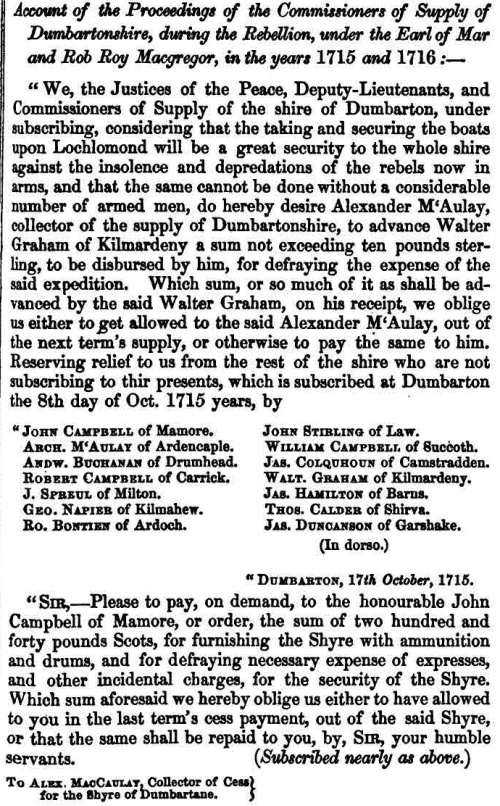
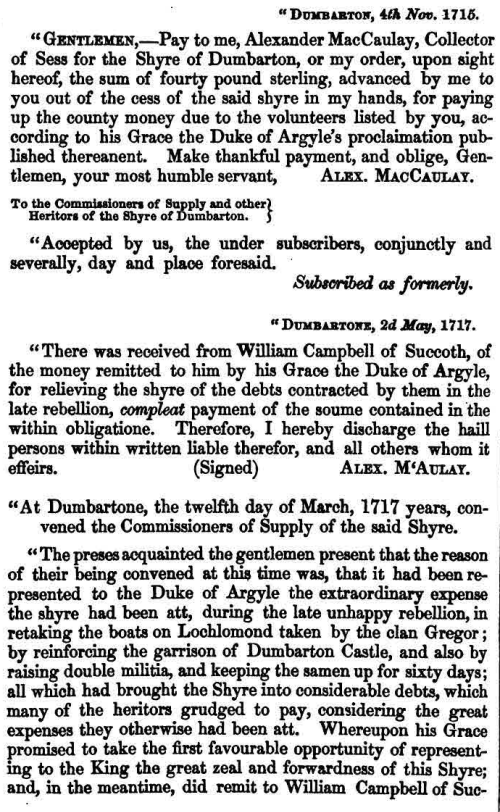
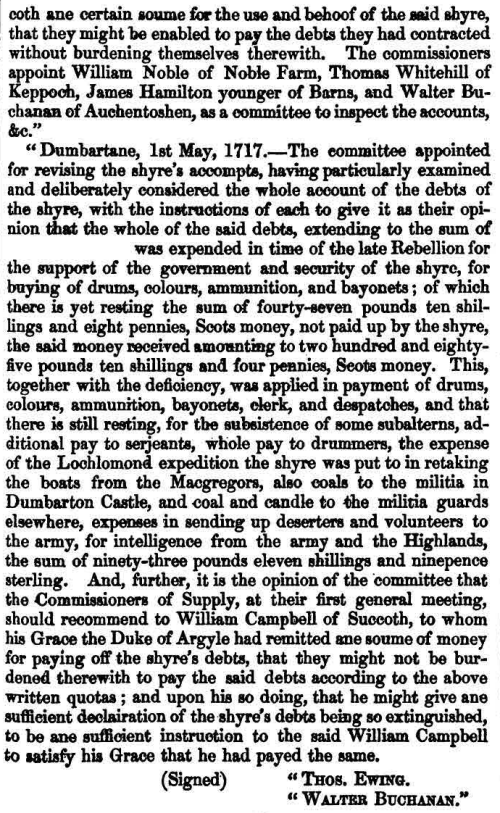
The Burgh of Dumbartons Extraordinary Expenses on account of the Rebellion
of 1715.
In the Tolbooth of Dumbartane, the second day of
June, 1716 years—The Magistrates and Counsil approves of the several
accounts given in by the tresuerer anent the expenses disbursed be him since
the 6th of June, 1715, to the deat hereof; relateing to the extraordinary
charges the toun was put to during the leat Rebellione, in paying of the men
hyred by the burgh for the reinforceing of the Castle of Dumbarton, and the
party sent out by the burgh, and for paying of the expenses of employing men
by the burgh for getting intelligence from the several parts of the country,
and otherwise, as is more particularly mentioned in the minutes set down by
the committee appointed for revising said accounts, which accounts being
accumulat amount to the sum of £442: 19: 6d. Scots money.
"The Magistrates and Councell lykewise approve of the account due by them to
Mrs. Calder, and spent by them at the election of the Magistrates, and other
gentlemen present with them on that occasion; and at several tymes with the
Deputy Leutenants and gentlemen of the Shyre when with them, anent the
safety of the toune and countrey; and for wyne and other liquors furnished
by her to the Magistrates, Deputy Liftenants, and uther gentlemen present
with them at the several solemnities for the victories obtained by his
Majesties forces over the rebels att Sherifmoor and Prestaune. Which account
extends to the soume of £192: 10: 4d. pennies Scots,
Item.–.-Monga Buchanan's account, spent in his house with the half-pay
Officers of Lord Mark Kerr's redgiment, and making several gentlemen
Burgesses, and about uther affairs of the Burgh. Amount, £101 : I: 0d.
Scots. Jtem.The account given in by Mistres Colquhoun,
since the 20th of August to the deat hereoff, for liquors and uther
provisions furnished to the party of Burgesses sent from the toune to joyne
and assist those employed for retaking the boats seased by the Maegregors in
Lochiomond; and spent with the officers and men who came from Pasley to
reinforce the toun, when they were threatened by the rebells; and in making
of the officers pf the severall redgements that went thro' the town to
Argyllshire Burgesses; including the allowance given by the Magistrates to
the several guards kept in the toune during the continuance of the leat
rebellion; which account extends to the sum of £146: 19:. Scots.
Item.—Mistres Buchanan's account spent in her house att several times with
the Earl of Glencairn, and with the captains of the men-of-war, who were
made burgesses, they having assisted the burgh in retaking the boats from
the Macgregors, and spent with Mr. Graham, sherif, and other gentlemen at
several times anent the burgh's affairs, and with the officers of Cournal
Edgertoun's redgement quartered in the toun; amount, £109: 10:. Scots.
Item.—The account given in by Mrs. Lindsay and spent in her house by the
magistrates and justices of the peace and other gentlemen of the shyre
employed in the militia, and spent by the magistrates on uther occasions;
amount, £52 : 9s. Scots.
Item.—The account of David
Hutcheson for ane guard-room in his house for the officers of the militia
and Cournal Edgertoun's redgement keeping guard in the Tolbooth, and for
coal and candle to them in his house; amount, £20: 9s.
Item.—Bailly Weir's account for powther, lead, and flint stance furnished be
him; amount, £8: 8s.
Item.—Ane account by Alexander
M'Farlane, spent in his house by the magistrates with the officers of
Edgertoun's redgement and other detachments, in demanding bilgats for the
detachment, extending to the sum of £4: 10s.
Item.—Ane
account be Aulay M'Aulay, spent in his house by the quarter-master, in
drawing bilgats to the forces, militiamen, and men-of-warr's crew; amount to
£5: 19s.
Item.—Ane account to Mrs. Buchanan, spent in her
house by the magistrates with the officers of the men-of-war, with the
Pasley-men who came to assist the toun in the tyme of the late rebellion,
and with the sheriff and other gentlemen of the shyre on several occasions;
amount, £110: 19s.
Item.—To Andrew Graham, clerk, in
consideration of his extraordinary pains and charges he was put to upon the
town's account during the rebellion, £8.
Item.—The
Magistrates and Council appoint Gilles Mitchell, the Threasurer, to pay to
the several persons from whom the sax baggage horses were bought that
dragged up the boats up the Leven, and were sent to the army; and to dispose
of what of the said horses are now returned to the best advantage;
altogether amounting to £1234: 12: 10d. pennies, Scots money."
We may remark here, in concluding the account of this extraordinary
Rebellion, that the County appears to have got their expenses returned by
government; but it does not appear from the record that the Magistrates ever
applied for their quota, or that the poor Burgh was ever refunded a single
shilling. Such has generally been the egregious remissness of the official
gentlemen of the Burgh, during more than a century past, that we have been
Involved in ruin and poverty, and our public finances thus often thrown
away, for the want of a simple application for their reimbursement. My
general remark, however, only applies to the century preceding the passing
of the Reform Bill. Since that period, the gentlemen who have successively
filled the office of the Town Council have honourably husbanded the finances
of the Burgh with the greatest care, and managed the other affairs generally
with the greatest credit to themselves and benefit to the community.
ELECTION OF A MEMBER OF PARLIAMENT FOR THE BURGH.
In the
palmy days of Toryism, and while the old rotten Scottish burgh system
prevailed, many strange things were transacted in private, which the Burgh
officials then in office would scarcely allow to see the light of day.
Eventually, however, they were publicly exposed to observation, by the
brilliant sun of the Reform Bill. With the other Burghs in Scotland, ours,
for a long series of years, shared in misrule, mismanagement, and
prodigality of expenditure, to even an excessive amount; so that when the
Act passed for cleansing these Augean Burgh Stables, she was compelled to
yield her-Eel! up in a state of insolvency. At the period referred to, our
liabilities amounted to about £20,000, and assets to about £17,000. Besides
other valuable property and fishings, we held an extensive moor of from four
to five thousand acres, granted to us originally by Royal charter. This
domain of land, being situated about five miles distant from the Burgh, was
not so vigilantly guarded from the rapaciousness of the neighbouring
proprietors as it ought. The consequence was, that many of the conterminous
possessors of land took each a slice of it, without price or measurement.
Such Vandal spoliation could not be tolerated. Nevertheless, having retained
it for many years, they had the hardihood to fight the Burgh for this cheap
land, at the Court of Session and the House of Lords, with great expense to
all parties: the Corporation, however, finally triumphant. The first
encroachment made on these lands was in April 1719 and the legal prose..
dure was ended in 1843; being a period of 124 years, during which It cost
the Burgh, to defend it at Court, about the value of the whole land—l0,)0
sterling. Lying adjacent to the lands of James Ewing, Esq. this valuable
piece of ground has been recently purchased by him; which forms a fine,
addition to his beautiful estate of Strathieven. The above legal and other
extravagant debts became at length an Inoubes on the sbolders of the Burgh,
wider which she could scarcely stand; especially if there be added to these
a little profuse public and private feasting, and an enormous expenditure in
defending our "Exemptions on the River Clyde" from the grasping ambition of
the "Glasgow River Trust,Mwhioh latter matter has cost this Town and other
companies and commercial gentlemen connected with the Burgh, during the last
twenty years, more than £10,000!
In bygone years, the head
of our Municipal Corporation was a gentleman of wealth, influence, abd great
courtesy; and, withal, possessed of deep political acumen, as the following
interesting Parliamentary election manoeuvre will show:-
The Provost occasionally swayed Burgh matters like an autocrat or petty
prince over the other Councillors, some of whom were so shallow in the
understanding that they could scarcely give an opinion on any subject.
Hence, on any important matter being discussed at the Council table, the
interrogatory was often put—What does the Provost say? and all bowed
obsequiously to his opinion.
Previous to the passing of
the Reform Act, the City of Glasgow, with Dumbarton, Renfrew, and Rutherglen,
unitedly sent a Member to Parliament. Glasgow generally wished to claim
right, by her great wealth and influence, to monopolise the selection of the
Member to herself. On the election of the candidate by the four Burghs, when
there was a parity of votes, the casting vote went to each Burgh
alternately. At the period we speak of, the casting vote fell to the Burgh
of Dumbarton.
Archibald Campbell, Esq. of Blythswood, and
Kirkman Finlay, Esq. of Castle Toward, both appeared as candidates. The City
of Glasgow and Burgh of Renfrew were favourable to Mr. Campbell; Ruthergien
was in rather a doubtful state between the two gentlemen. This state of
things gave rise to the tug of electioneering war: Dumbarton set to work
zealously to play her political cards in the matter. Our dexterous Burgh
leader laid down and accomplished the plan of conferring a series of
kindnesses on the good honest Rutherglen officials; and, being peculiarly
well attended to, they were neither dry nor hungry for ten complete days.
The result was, that a majority of the Town Council of Rutherglen were
favourable for voting along with the Burgh of Dumbarton; and, in order to
keep them secure from being tampered with by the City of Glasgow, it was
proposed that they should take a "Highland jaunt." Two coaches were
therefore speedily procured, and, without much ceremony, they left the Royal
Burgh of Rutherglen for the Highlands.
The interesting
tour extended to Drymen, Aberfoil, Loch Ketturin, Loch Lomond, and the top
of Ben Lomond; which mountain they nimbly ascended, accompanied with
servants bearing Champagne and "Mountain Dew;" and every other creature
comfort for their honours' entertainment. On this lofty eminence, the
Council being duly constituted, it was moved, seconded, and unanimously
resolved, that they support an eloquent young gentleman, a branch of the
family of the Provost of Dumbarton—in preference to either qf the other two
candidates. Business being finished, they then adjourned from the top of
lofty Ben to the low country. In due time they arrived at our Burgh, from
the elevated mountain of their deliberations, and passed a happy night or
two with our own officials, in fixing and maturing preliminaries for
carrying the united decision of the two Burghs into effect.
In the midst of this triumph, when hilarity and joy prevailed, a poetical
wag composed the following humorous lines on the occasion:-
Not a cheep was heard, nor the slightest noise,
When the Provost declared
his opinion;
Not a Councillor raised his husky voice
To oppose our
patron's minion.
We settled it all at the dead hour of
night,
When the vulgar herd were dreaming;
When six wax candles were
blazing bright,
And a glorious bowl was streaming.
No
useless conditions clogged our votes,
Nor with pledge or promise we bound
him;
But we sent him away to the Commons' House,
With all his
independence around him.
Pew ani brief were the speeches
we made,
And we spike not a word of sorrow;
But we steadfastly gazed
on the ample bowl,
With the prospect of headaches to-morrow.
We thought, as we drank our Member's health,
With a bit of a short
oration,
That the storm without might rage and howl.
And the Member
might go to his station.
Lightly they'll talk of him, now
that he's gone,
Perchance they may even upbraid him;
But little he'll
heed, if he gets a good berth.
And a snug little salary paid him.
But half of our tipple was hardly done,
When the clock told the hour for
retiring;
And we saw the rays of the morning sun
Coming up the
horizon skyring.
Sinuous were the erring paths we made
To the place of our dormitory;
Where we tumbled In with boots 'pon the
bed,
And they left us alone In our glory.
EXEMPTIONS
ON THE RIVER CLYDE.
We will shortly turn attention to a
subject which has occupied the deliberations of this community during many
years past, and which it would be unpardonable to omit, in concisely
sketching the local history of our ancient Burgh. We refer to the exemptions
on the River Clyde enjoyed by the resident burgesses of Dumbarton. The
defending of these, in repeated contests before the British Parliament, from
the rapacious hands of the Clyde trustees, has cost the burgh, with the
shipowners and other merchants here, from £10,000 to £12,000 sterling. All
we intend at present is to give an historical epitome of these invaluable
immunities, from the earliest period to the present time, with the
examination of Mr. Pollok, partner of the firm of Messrs. Pollok & Gilmour,
timber importers, Glasgow, and also of Mr. Thomson, lessee of the river
dues, before "a committee of appeal," in the Rouse of Commons, in the year
1830. During the revolution of the fourteenth and
fifteenth centuries the commercial traffic of the Clyde was of minor
importance, as it consisted chiefly in short voyages made in small craft to
the several ports, lochs, and bays which lay scattered along its banks:
these were undertaken for the supplying of the local wants and necessities
of the inhabitants who dwelt in the towns, burghs, and villages which skirt
its delightful shores. The foreign trade of North Britain in these early
days, from its trifling nature, scarcely indeed deserves the name. Flanders
was the principal port to which vessels went from the Clyde. Their cargoes
were comprised of only a few articles of rude produce, such as "wool and
wool fells," &c.; their imports were some articles of "haberdashery,
cart-wheels, and wheelbarrows," which certainly show the very low state of
mechanics in Scotland at this era. (See Nackluft's Voyages, 1599.) With
France a little intercourse was held, but it could not be said to partake of
commerce, strictly so called, being rather of a naval and martial nature.
The Duke of Albany, who was apppointed Regent of Scotland in 1515, arrived
at the Castle of Dumbarton, from France, with eight ships loaded with
ammunition and other warlike stores.
By the Charters of
Erection of the Royal Burgh of Dumbarton, and particularly by a Charter of
Confirmation of King James VI. granted in the year 1609, the corporation and
community of Dumbarton acquired right to levy rates and duties from all
"ships and vessels, currachs and crearies," of every description, whether
home or foreign, with goods therein, navigating the River Clyde, from the
"water of Kelvin," near Glasgow, to the head of Lochlong in Argyleshire. For
centuries no foreign or home vessel dared sail past the Castle— which was
like the Dardanelles—for fear of its guns, without first "breaking bouk,
tapping and Selling" of their cargoes to the favoured burgesses of Dunbriton,
and taking "out cocquets," or clearances, and paying the dues and customs to
the Burgh, before proceeding to Glasgow on their voyage.
We find a very old document amongst the Burgh records, referring to these
privileges and immunities, purporting, we suppose, to be a kind of law
paper, entitled "Informstione for the Toune of Dumbartane, contra the Toune
of Glasgow, 1666"-181 years old—wherein it is stated "that by verteu of
foirsaad chartors and evidents, Dumbertane has had continuall pos8essione
past inemorie of man, and they hay undoubtted richt to thei particulars
following, viz, entries, anchorag, measorag, weyag, tunnag, and assyse bola;
to witt, a bol befoir the mast, and a bol eftiir the mast, of al vesselis
loadent with salt belounging to strangers; as also sue hoggheid of wyne
before the mast, and another eftir the mast, of all vessels loadent with
wyne, belonging to strangers, as ad. is. Item, two daills of evrie hundred
dahlia, and so of uther timber belonging to strangers," &c.
The customs, dues, and revenues from the River Clyde were held and enjoyed
by Dumbarton for many centuries; till, in the year 1700, the City of Glasgow
became envious of these invaluable immunities, and purchased them from the
Burgh of Dumbarton, for the sum of 4000 merks Scots, or £250: 2d.
sterling—under the expressly stipulated condition of Dumbarton reserving her
burgesses' right of navigating the Clyde freely, with all their vessels and
goods, and being exempted from all dues at the Broomielaw, and every other
port belonging to Glasgow. A contract of sale was solemnly drawn out,
sanctioned and approved of at the convention of Royal Burghs, 9th of July,
1700, and ratified by the Scottish Parliament in 1701, entitled
"Ratification of a Contract betwixt the Burghs of Glasgow and Dumbarton,
anent their rights and privileges to the River Clyde." Wherein it is "declaired
that the hail vessels and boats belonging to the Burgesses, inhabitants of
the Burgh of Dumbarton, of whatsomever size, are exempted from, and are no
wise liable in, payment of any duties whatever at the said Burgh of Glasgow,
l3roomielaw, Port-Glasgow, or any other port or harbour belonging
thereto--,So that both Burghs are hereby declared free at each others' ports
in all time coming."
In the year 1825, the Trustees of the
River Clyde applied to Parliament for powers to increase the rates and
duties on the said River, and at the said harbour of Broomielaw; and they at
that period made a very dishonourable and flagitious but unsuccessful
attempt to subvert entirely the chartered legal vested rights of the
Burgesses of Dumbarton. These valuable privileges were nobly defended by the
late Provost, Jacob Dixon, Sen. and were, by his exertions and influence in
Parliament, recognised in a clause of the said Act, but greatly curtailed
from their original extent. The defending of these rights, with the
Parliamentary contest in getting them embodied in the bill at that period,
cost the burgh and community of Dumbarton a large sum of money, which they
could ill afford to spare, burdened as she then was, and still is, with a
load of debt.
In 1829, the river Clyde Trustees again
entered Parliament against Dumbarton, with the bold and unprincipled design
of obtaining powers "to abrogate entirely the exemptions enjoyed by the
burgesses of Dumbarton on the river Clyde!!" not deigning to ask whether she
would sell them or not!! It is needless to remark, that, after another
severe contest, the bill, by an enlightened legislature, was ignominiously
thrown out, with a gentle philippic bestowed by the Chairman of the
Committee on the then River Trustees. In the printed case for the River
Trustees, laid before Parliament, they say "the exemption appears to people
in general so unjust, unreasonable, and extravagant, that they are satisfied
that it will not be allowed by Parliament longer to exist!!" The defeating
of this bill cost the burgh £1500 sterling and upwards.
Next year, 1830, again the Trustees appeared in Parliament against
Dumbarton, but they were by this time persuaded and convinced that it was
far from honourable or just to deprive poor Dumbarton of her just rights and
property, without a fair and adequate indemnification. They therefore gave
notice of a "Bill to be introduced into Parliament for repealing the whole
Acts relating to these exemptions, in so far as the said Acts or any of them
grant, provide, or recognise any exemption or immunity in favour of ships,
barges, lighters, steam-boats, or any other boats or vessels, with the
cargoes thereof, belonging bonafide in property to burgesses, resident
inhabitants of the towns of Dumbarton and Glasgow respectively, from the
payment of river or harbour rates or duties payable upon the said river, in
virtue of the said Acts, or any of them, or otherwise; and for enabling the
Trustees, acting under the authority of the said first recited Act, to
purchase up and acquire any such exemption or immunity from any person or
persons, or body or bodies corporate, to whom the same does or may belong,
or for otherwise relieving the said Trustees and the public of the effect of
such exemption or immunity."
Our burgh had again to buckle
on her armour, and meet again in Parliament her formidable foe. A
corporation, possessing such an ample revenue at their command, were
determined to crush the ancient Burgh under their feet, and drive her to
frequent bankruptcy and ruin.
In the speech of Mr. Wynn, a
member of the committee of the House of Commons, delivered on this occasion,
in June 1830, he indignantly and eloqueutly remarks:- "See what prodigious
advantages are given by a practice, such as this, to a corporate body having
large funds at its disposal. They can say to a party of more limited means,
'we shall tire you out; year after year we will recommence the same system
of litigation,' until at length the patience of their weakened opponent is
at an end, and his funds are exhausted, and he has at length in despair to
relinquish that which he believes to be his just rights." (See Speech of Mr.
Wynn, in the House of Commons, 10th June, 1830.)
The Bill
passed the Committee of the Commons, embodying the following clauses:—"That
the amount and value of the exemption is declared to be £15,000, which sum
is to be expended on the improvement of the harbour and quays of Dumbarton,
and the present owners of vessels and steam-boats are to have the exclusive
privilege of exemption during their lives."
A petition of
appeal from the decision of the Committee on this Bill, in name of the
Magistrates, was forthwith carried into execution, and presented to the
House on the 26th June, which was granted, on a division, by a majority of
24 to 17. The Committee of Appeal consisted of seven members, who were
ballotted for. The Committee met first day, but no business done; and having
assembled second day, heard Mr. Harrison, on the part of the Corporation of
Dumbarton, and Mr. Adam in answer, for the Trustees of the River Clyde.
Adjourned, for the purpose of perusing the evidence at leisure.
On Monday, the third day, after mature deliberation, from which the parties
were as usual excluded, the Chairman, on their being recalled, stated that
the Committee consiiei'ed any remarks unnecessary; that they had passed a
resolution to report "the preamble of the Bill not proved; and, further,
that supposing a preamble had been proved, sufficient, to justify a Bill,
they could not find, in all the minutes of proof; one title of evidence to
show that £15,000 was a just compensation, or that it oould be beneficially
expended on the harbour of Dumbarton; but if the counsel for the R. Trustees
could point out any evidence in the minute; bearing upon that point, the
Committee were willing to hear him." This opportunity Mr. Adam, counsel for
the Trustees, at once declined; remarking to the Appeal Committee, "that he
was not a candidate for the honour of leading 'a forlorn hope.'" The
consequence was, that the Bill was thrown out, after it had cost the River
Clyde Trustees nearly £4000—the Burgh of Dumbarton about £1950—the Dumbarton
Steam-boat Company and Shipowners, about £1000—and also, the Dumbarton Glass
work Company, about £1000: total, nearly £8000. The-following are a few
brief extracts from the minutes of evidence taken before the Committee on
the above bill; showing the importance and great value of these exemptions
to the Burgh and Burgesses of Dumbarton. Mr. John Thomson was called, and
examined by Mr. Heath, counsel for the promoters of the bill.
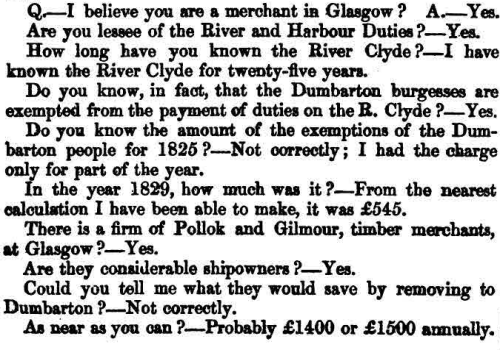
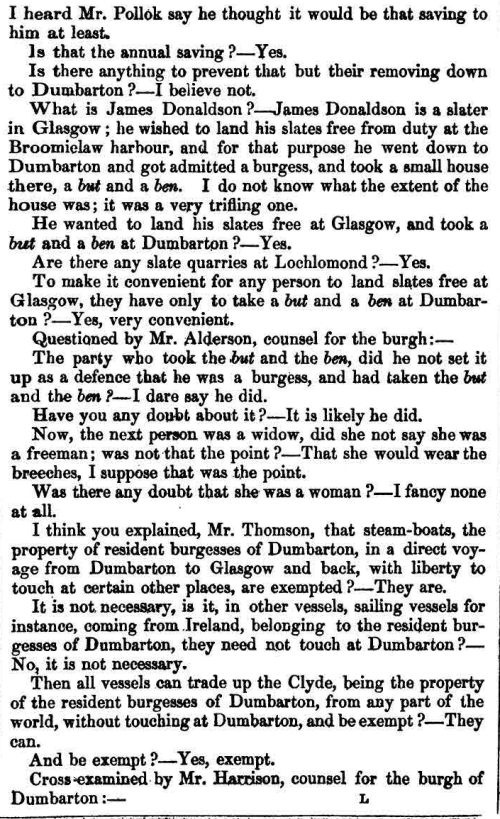
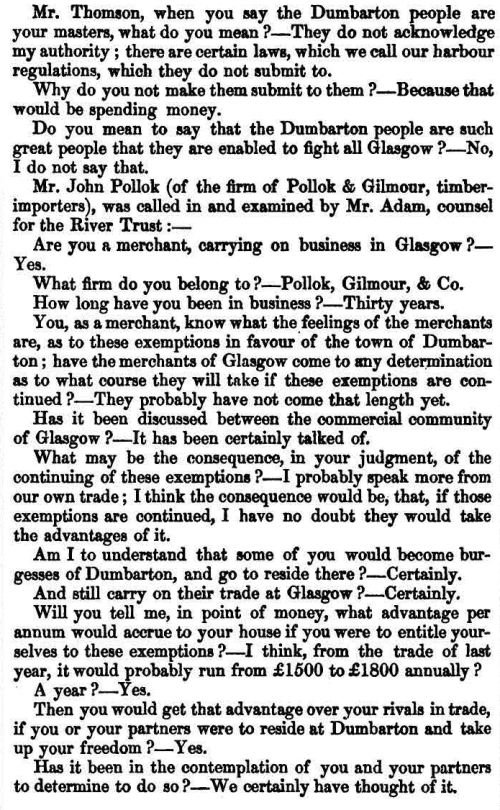
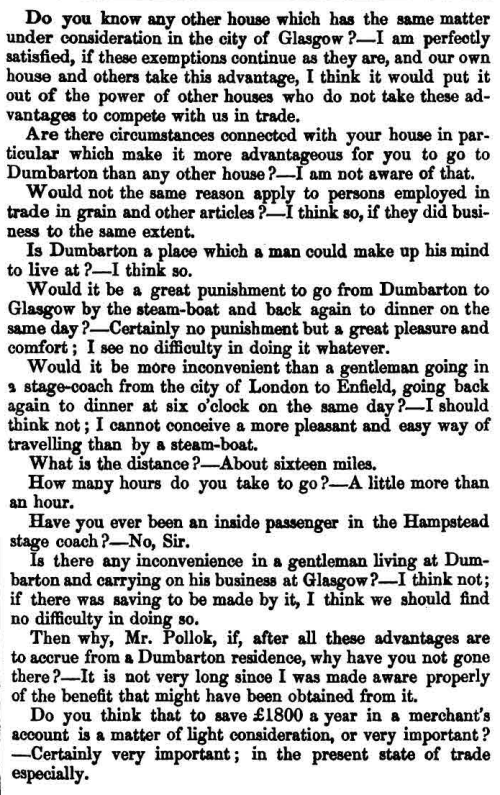
Immediately after the abandonment of the bill by the Clyde Trust, the writer
of these pages was assured, by the late Provost Jacob Dixon, the late Mr.
James Rankine, and others of the Town Council, that the Burgh and Burgesses
of Dumbarton would have obtained about £50,000 from the River Trust for the
entire abolition of these exemptions, so valuable and important did they
then appear in the estimation of the "Trustees." For being the very active
and efficient instrument in getting the Appeal Committee in the House of
Commons, who gave the death-blow to this bill, Provost Dixon, on his arrival
from London, was met in the vicinity of the Town by the great body of the
Burgesses, with other gentlemen, and honourably escorted into the ancient
Burgh, passing under a triumphal arch, formed of flowers and evergreens,
erected for the purpose of thus doing him honour.
Again,
in January, 1836, our formidable and wealthy opponents dragged the Burgh
within the walls of St. Stephen's, by another Bill, empowering them "to
purchase up, by jury valuation, the exemption of Dumbarton Burgesses on the
River Clyde," and the jury to be composed of "Lanarkshire gentlemen" alone.
The official gentlemen of the Burgh, and the general body of the Burgesses,
seeing that the oft-repeated attacks made on these immunities by the Clyde
Trustees were not only vexatious but absolutely ruinous to the burgh and
corporation, resolved to effect with the Trustees a private sale, if a fair
and adequate remuneration were obtained, and the necessary clauses on
arrangement could be inserted in the Bill to be brought in. Several
conferences were held by a deputation from Dumbarton with a sub-committee of
the Trust. £16,000 sterling was talked of as being a fair equivalent for the
privileges, under the express reservation of the life-rent right to all the
existing resident burgesses of the Burgh; and £10,000 more for their
life-rent right; making £26,000 for an out-and-out sale. Further conferences
took place privately between the parties, with a variety of correspondence,
embracing several important points, all of which finally ended in agreeing
to give and accept of £15,000 in cash for these long-contended for
privileges, under the express reservation of the life-rent right to all the
resident burgesses of the burgh of Dumbarton then existing. The following
are the most important clauses mutually agreed upon, and which were embodied
in the Bill alluded to; In place of thso of the jury valuation clause in it
originally :-
"And whereas it would be kbr the public
advantage, and for the 6ene1t 6f the traders uponthe said river and Firth of
Clyde, and resorting to the said harboth; if the said rights of exemption or
immunity were repealed and done away with, compensation and indemnity being
made and granted for the same to the body or bodies politic, corporate, or
collegiate, or person or persons entitled thereto, to the extent to which
the said exemptions at present exist.
"Be it therefore
enacted, and. it is hereby enacted, That the said Trustees shall, within
three months from the date of the passing of this Act, pay, and are hereby
required to pay, from the funds under their management, the sum of fifteen
thousand pounds sterling to, the Magistrates and Town Council of the Royal
burgh of Dumbarton, for the bohoof of the burgesses and community thereof,
as a fair ,and adequate compensation and indemnity to the 'corporation,
burgesses, and community of the said burgh, for all the immunities and,
exemptions enjoyed by them under the said recited. charters, contracts, and
acts, under the express and understood reservation always of the rights of
existing resident burgesses, as hereinafter provided for. And that the whole
of the said immunities and exemptions recognised or granted by the said
charters, contracts, and acts, shalt, under the reservation aforesaid, from
and after the date of the said payment, be entirely abolished, extinguished,
and for ever cease and determine."
The other clauses and
provisions of this Bill having the more extensive deepening of the Clyde,
purchasing property adjacent to its banks, forming wet docks, extending and
otherwise improving the harbour, borrowing money to an euormois amount,
augmenting the rates on tonnage of vessels, steamers, and goods; it
therefore met with formidable opposition from a host of parties whose
interests it affected. But happily it cost our Burgh little or no expense,
she having previously arranged 'with the Trust, and guaranteed to petition
in its favour, which was all her cost. It was, however, like some of its
predecessors, sentenced to death by the legislature, executed, and
dishonourably thrown out!!! The last contest with the River Trust is well
known, for it is scarcely six months old. We are now happy to say, that,
through the great exertions of a deputation of burgesses sent to London, who
were nobly supported by our County and Burgh members of Parliament, we have
now got a clause into the "River and Dock Bill" of the Trustees, recently
passed, allowing our steamers a place at the Upper Wharf, which the
Committee of the House of Commons stated we should always have enjoyed.
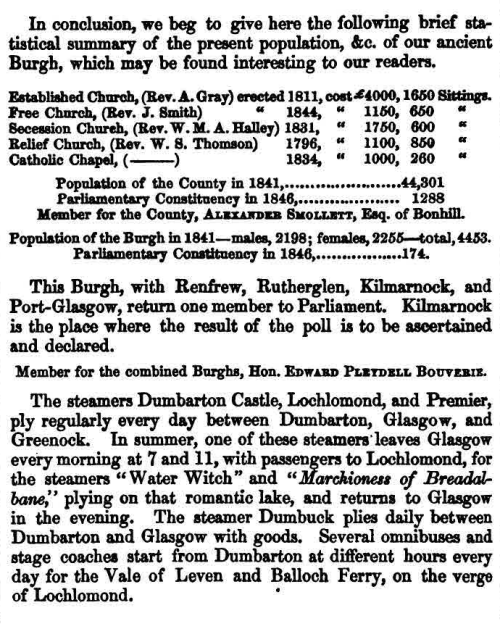
|

